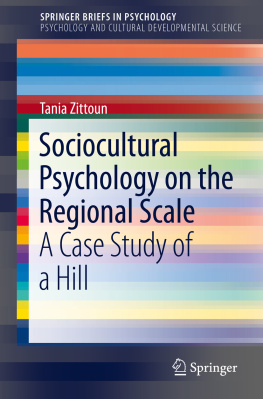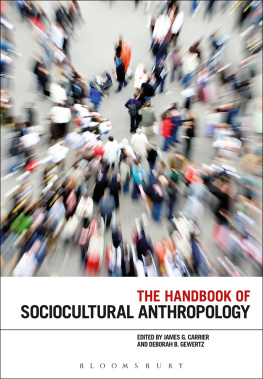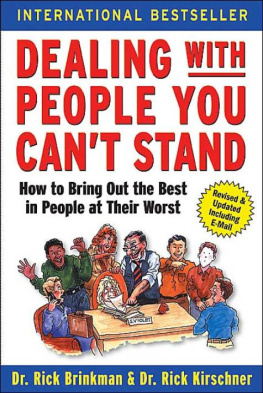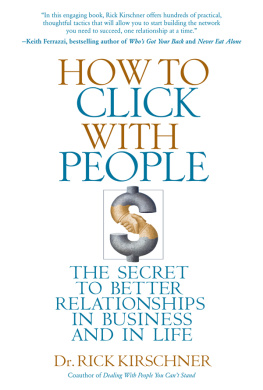Rom Harrs chapter first appeared in Theory & Psychology 12.5 (2002). It is included here with the permission of Sage Publications. Portions of Mark Freemans chapter appeared earlier in Warum Menschen sich erinnern knnen, ed. H. Welzer and H. J. Markowitsch (Stuttgart: Klett-Cotta, 2006), and Interchange: A Quarterly Review of Education 38.3 (2007). These writings are reprinted here with the permission of their respective publishers.
The editors wish to express their appreciation to Lauren Dockett, executive editor at Columbia University Press, for her enthusiasm about this project, and to the anonymous reviewers for their very helpful feedback.
Suzanne Kirschner would like to thank Timothy Austin, vice president for academic affairs and dean of the College of the Holy Cross, and Richard Schmidt, chair of the Psychology Department at the College of the Holy Cross, for granting her a research leave in order to ensure completion of this book. She owes her deepest gratitude and love to her family. She thanks Len for his unfailing, unselfish love and encouragement, and for the many forms of support he has provided. She thanks Alex for the pleasure of his company all the times he sat nearby and played or read while she worked on the manuscript, as well as for the privilege of being his mother and watching him grow.
Jack Martin wishes to acknowledge the support of Simon Fraser Universitys Burnaby Mountain Endowment Trust for supporting his work and for funding in aid of some of the preparation and indexing of this volume. He would also like to thank Wyn for her support, encouragement, and patience with yet another lengthy period of writing and editing over many hours and occasions.
An Introduction and an Invitation
S UZANNE R. K IRSCHNER AND J ACK M ARTIN
In recent years constitutive sociocultural perspectives have become increasingly visible and influential within psychology. Such perspectives envision psychological processes, such as the mind and the self, as phenomena that are socioculturally constitutedthat is, actually made up within, as opposed to merely facilitated by, culture and society. These constitutive approaches to psychology understand cognition, emotion, memory, identity, personality, and other psychological constructs as relational entities that emerge out of interactions with others within a sociocultural context. Moreover, the perspectives included under this rubric all have a cultural-historical aspect that moves consideration of the sociocultural beyond the immediate interpersonal and social situation.
Constitutive sociocultural approaches have been articulated over the past several decades by a diverse group of psychologists and social researchers whose work has emphasized, in various ways, the inseparability of the psychological and sociocultural realms. These researchers include Urie Bronfenbrenner (1979), Jerome Bruner (1990), Roy DAndrade (1990), Pierre Dasen (1977), Yrj Engestrm (1990), Jacqueline Goodnow (Goodnow, Miller, and Kessel 1995), Patricia Greenfield (1984), Sara Harkness (Harkness and Super 1992), Edward Hutchins (1991), Vera John-Steiner (1985), Shinobu Kitayama (Markus and Kitayama 1991), Jean Lave (1988), Hazel Markus (Markus and Kitayama 1991), Carl Ratner (2002), Barbara Rogoff (2003), Geoffrey Saxe (1991), Sylvia Scribner (Scribner and Cole 1981), Robert Serpell (1976), Richard Shweder (1990), James Stigler (Stigler, Lee, and Stevenson 1990), Charles Super (1981), Michael Tomasello (1999), Jaan Valsiner (1998), Dan Wagner (1993), James Wertsch (1998), Sheldon White (Cahan and White 1992), and many others (including the contributors to this current volume). At this writing, several major psychology journals (including Mind, Culture, and Activity, Theory & Psychology, Culture & Psychology, Narrative Inquiry, and Subjectivity) regularly publish work in sociocultural psychology that adopts constitutive, strongly relational perspectives. Moreover, many colleges and universities now offer courses in fields such as cultural psychology and narrative psychology; a growing number of graduate programs even afford students the opportunity to specialize in sociocultural theories and methods. Beyond psychology, these types of contemporary sociocultural approaches to psychological phenomena and issues are currently being applied widely in education, social work, psychotherapy, business, nursing, language instruction and learning, and many other areas (e.g., Hoshmand 2006; John-Steiner, Panofsky, and Smith 1994; Kozulin 1998).
However, sociocultural perspectives are by no means new. Even constitutive sociocultural approaches, such as those presented in this volume, have deep roots in several classical and early modern intellectual traditions. Richard Sorabji (2006) has recently pointed out that the ancient Greeks tended to a view of self and self-knowledge as relational not only by means of their connection to the cosmos, but also, more specifically, by means of the selfs connection to social others. In contrast to the detached, inner cogito of Augustine and Descartes, Plato held that self-knowledge is hard to attain, and that seeing our selves reflected in others is often the best source of such understanding. Indeed, it was largely for this reason that Aristotle extolled the value of friendship, for it is through friendship that one comes to perceive and know both others and ones self, and is able to enter into the greater good.
Although many scholars (e.g., Guignon 2004; Taylor 1989) have correctly associated much Enlightenment and Romantic thought with a deeply interior, reflective, and ruminating conception of the psychological person (the infamous Cartesian self dwelling in splendid isolation from the world and others), it would be a mistake to think that relational and cultural-historical conceptions of psychological persons did not permeate much Western Enlightenment, Romantic, and modern thought prior to the founding of disciplinary psychology toward the end of the nineteenth century. The work of eighteenth-century theorist Giambattista Vico (2000) is often cited as an important precursor to such approaches. But as Jerrold Seigel (2005) convincingly demonstrates, Vico was not unique in exploring the sociocultural sources of mind and self. John Locke, and especially his successors David Hume (see also Murray 1993) and Adam Smith, actively sought a philosophy of psychology that emphasized the importance of points of attachment offered by life with others (Seigel 2005:43). Seigel cautions us not to confuse the recognition that modern psychology requires individuals themselves to participate in their own self-formation with the idea that modern individuals can look only to themselves to give their psychological lives coherence and stability. Indeed, a long line of Anglo-American and Continental thinkers have held that our social relations with others have primacy with respect to our psychological existence, being an indispensably necessary source for our thinking about the world and ourselves. Such individuals include not only the English descendants of Locke, but also many German scholars (e.g., Herder, Fichte, Hegel) who stressed our dependence on social and material existence, even as they advocated that knowledge of the self could serve as a model of the world. French-speaking thinkers, too (e.g., Diderot, Rousseau, Constant), recognized the inescapable influence of social forces on our psychological lives, even while cautioning that we must shield ourselves from some of societys more oppressive and distorting powers.











